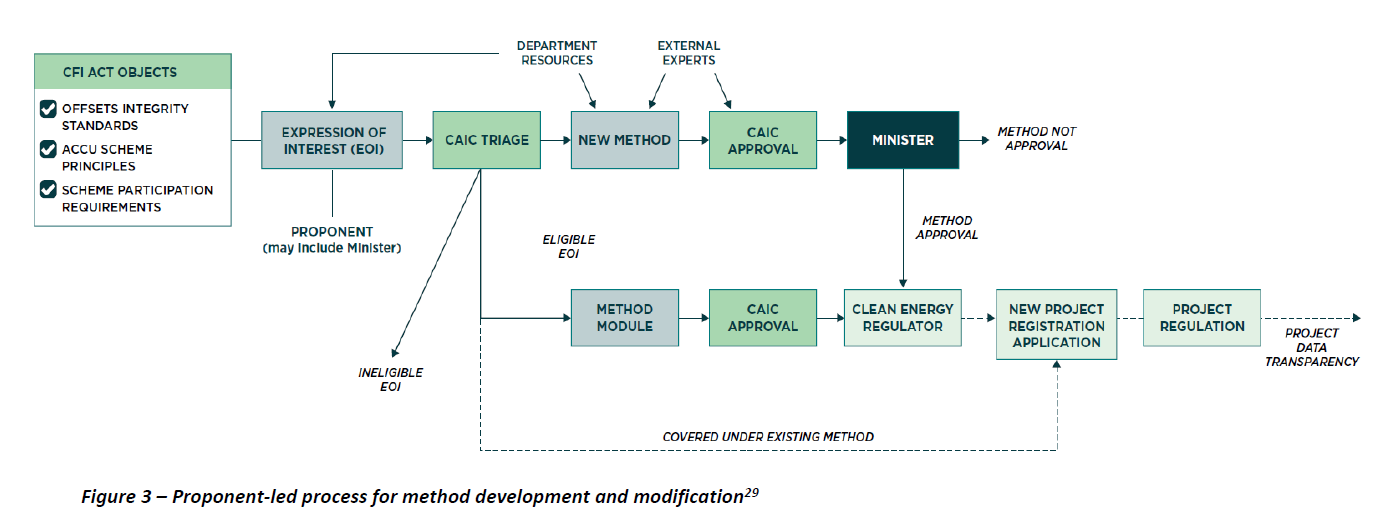As part of the implementation of the Chubb Review recommendations (Chubb Review), the Government has released a consultation paper on proposed amendments to the ACCU Scheme (Consultation Paper).
The Consultation Paper covers:
- New ACCU Scheme principles;
- Information publication requirements;
- The Commonwealth Government’s role as a purchaser of ACCUs;
- The new process for development of methodologies;
- The functions of the Carbon Abatement Integrity Committee (CAIC); and
- The requirements for native title consent to projects.
The reforms are aimed at improving integrity of the ACCU Scheme, given its critical role in achieving Australia’s emission reduction targets of 43% by 2030 and net zero by 2050.
Improving Governance and Transparency
The Chubb Review recommended that the Offsets Integrity Standards (OIS) set out in the Carbon Credits (Carbon Farming Initiative) Act 2011 (CFI Act) should be supplemented with ACCU Scheme principles, to ensure that the OIS are applied consistently in method development and project implementation and administration.
The ACCU Scheme principles will guide the development of new methods, assist the CAIC in considering method proposals and variations, and provide assistance for administering the ACCU Scheme. The following principles are proposed:
- Integrity
- Transparency
- Equitable access, participation and benefit sharing
- Practicability
- Environmental and regional sustainability
- Respect for First Nations
Another recommendation of the Chubb Review was to increase transparency. Amendments to the CFI Act have already been made to require the publication of carbon estimation areas for sequestration projects.
To further improve transparency, it is proposed that the Clean Energy Regulator (Regulator) would publish the following additional information in its Project Register:
- The location of all projects (not just projects under area-based methods)
- An improved description or detail of project activities
- The start date for the project’s crediting period
- The type of estimation approach used
- The number of ACCUs issued for each reporting period
- The carbon service providers and associated agents involved in managing the project
- Whether enforceable undertakings or adverse fit and proper person findings have been issued.
The Government is also considering publishing specific information relating to particular methods, such as for sequestration projects, growth pauses, estimated forest cover assessment dates, gateway check years and permanence plans.
Feedback is also sought about what information should be made public in relation to the holdings of ACCUs in the Australian National Registry of Emissions Units (ANREU). Disclosure options include:
- Publishing all information: this would include all information about a unit including what project the ACCU was generated from, and any claimed co-benefits;
- Publishing information of holdings over a certain size; or
- Publishing de-identified information only: namely, information about an ACCU’s source or provenance would not be published.
Further on the governance theme, the Chubb Review also recommended moving the purchasing of ACCUs away from the Regulator. The proposal is that future purchasing activity will take place by the Government, with the potential to use purchasing to support new method development, innovation or other outcomes such as increasing social, cultural, environmental or economic benefits. The Consultation Paper suggests that Government purchasing could achieve these objectives through targeted or banded auctions (for example, a purchasing round that seeks projects with delivery of priority co-benefits) or targeted contracting.
The Consultation Paper notes that consideration is being given to whether the exit arrangements for fixed delivery Carbon Abatement Contracts should be continued beyond the current pilot. To date, the two exit fee options that have been made available by the Regulator have resulted in sellers retaining almost 50% of ACCUs due to be delivered. One option posed by the Consultation Paper is requiring sellers to deliver a minimum percentage of their ACCUs due for delivery during an exit window, to be eligible to exit the remaining percentage.
Proponent-led method development
The Chubb Review recommended allowing proponent-led method development, rather than restricting this task to the Government. A further recommendation was to replace the Emissions Reduction Assurance Committee with the Carbon Abatement Integrity Committee (CAIC). The new approach will involve expressions of interest (EOIs) being submitted to the CAIC, as per the below schematic (shown on page 21 of the Consultation Paper).

In assessing EOIs, it is proposed that the CAIC would consider:
- Whether the EOI provides sufficient evidence that the proposed method will be able to meet the OIS;
- The abatement potential of the proposed method;
- The likely take-up of the proposed method;
- Whether the proposed method is likely to incentivise industry innovation;
- The relationship to existing methods and other EOIs;
- The skills and resources available to the method developer;
- Opportunities for generating co-benefits or increasing participation by First Nations people or regional communities;
- What is required to maintain proposed method tools; and
- Current workload and capacity of the Department or the CAIC to assist with method development and assess method proposals.
The Consultation Paper sets out other arrangements for proponent-led method development. It details the potential for future legislative amendments to provide clarity on when the “newness” test applies, such as allowing trials or research projects to be undertaken if needed to inform a method’s development. A further suggested approach is the use of ‘modules’, which could be independently approved by the CAIC. Modules could include activity/technology modules, measurement approach modules and abatement methodology factors modules.
At present, project proponents can chose whether to move to an updated method. The Consultation Paper proposes that the CFI Act will be amended to provide circumstances where legislative rules may require project proponents to move onto new or varied methods. This may also involve projects having to move to new baselines.
Native Title Consent
At present, “area based” projects are able to be registered before consent is obtained from Native Title holders. The timeframe for obtaining consent can be up to 5 years from the date of project registration. The Chubb Review considered that the ACCU Scheme needs to align with the principles of free, prior and informed consent, and recommended that conditional registration should be removed.
The Consultation Paper proposes a need for initial written agreement to be provided before a project can commence, with full consent being provided after project registration. Other options suggested include allowing conditional registration to take place provided that the project proponent pays the Native Title body corporate a fee or regular payments before the project starts, or requiring full consent to be provided before a project can be registered.
Feedback is sought on these options, as well as how an “eligible interest” in land should be defined for First Nations interests and what support and resources are required by First Nations eligible interest holders to enable consent to be provided.
Next steps
Submissions have been sought on the proposals in the Consultation Paper by 3 October 2023. The Department of Climate Change, Energy, the Environment and Water will be hosting in person and on-line workshops during the consultation period.
If you require further details on the Consultation Paper or require assistance to prepare a submission, please contact a member of our Climate Change team.








